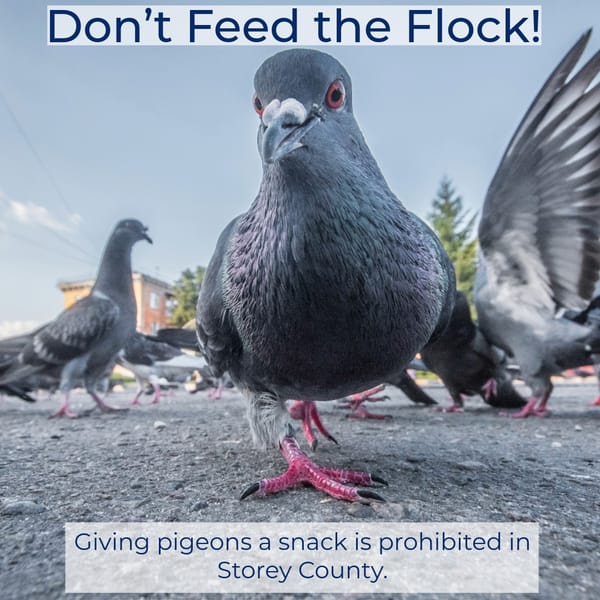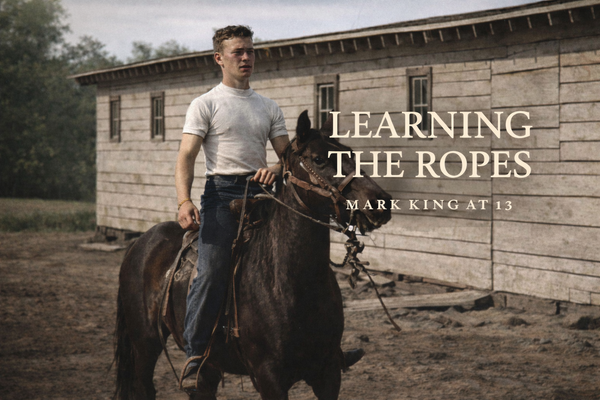King's Corner: The Sunfish and the Soul
When my dad, Mark King, was young, he didn’t just ride horses — he made them question their career choices.
Dad’s world smelled like leather, dust, and courage. He worked rodeos across the West, hazing cattle, chasing steers, and eventually—because apparently sanity was negotiable—riding broncs. That’s where he met the sunfish.
Now, a “sunfish” isn’t a horse’s name; it’s a position. When a bronc explodes out of the chute, a rider arches his back and shoots his legs straight out in front, taking the shape of a fish gliding through water. It’s a way to ride the violence—to turn chaos into rhythm, to stay on the back of a wild thing by surrendering just enough to its motion.
He was warned not to try that horse. Naturally, he took that as a dare.
Eight Seconds of Glory
Rodeo rules are simple: stay on for eight seconds, and you’re a legend. Dad strapped in, nodded to the gatekeeper, and the world exploded. The horse bucked like a storm with legs, and he met it with the sunfish position—back arched, legs extended, balanced between control and surrender. Every muscle knew its part.
The crowd gasped, the dust rose, and somehow he held on—riding that narrow line between fear and faith.
It wasn’t just athleticism. It was focus—the kind that shuts out everything but the next heartbeat.
Then, silence. The buzzer rang. The horse slowed. The crowd erupted. Dad dismounted—or tried to—and noticed the cluster of young ladies watching from the fence. Somewhere between pride and showmanship, he decided to make it a graceful dismount.
That was his second mistake.
When the Horse Fights Back
The horse reared, and Dad hit the dirt hard enough to question the meaning of gravity. He scrambled up the wooden fence just in time for the horse to whip around, catching him square in the face.
It wasn’t pretty. His cheekbone shattered. His eye was displaced. He went down cold.
They rushed him to the hospital. After reconstructive surgery and a long, slow recovery, he came home with a face that told a story, a stack of medical bills, and one unshakable truth: his rodeo days were over.
But the thing about my dad—he didn’t spend the rest of his life staring at the dirt. He learned from it. And when I think about what it means to get up after being thrown, I realize he was teaching a kind of soul lesson that outlasts the rodeo.
Falling Isn’t Failure
Most of us, somewhere along the line, get bucked off something we thought we could handle—a career that turns on us, a dream that doesn’t pan out, a season of life that suddenly feels impossible.
When that happens, it’s easy to start thinking like Cain—the first person in history to take disappointment personally. The old story says he brought an offering, wasn’t accepted, and spiraled into anger, envy, and despair. He felt rejected, not just in his work, but in himself. And that dark thinking turned him against everything he loved.
My dad could’ve gone the same way. He could’ve turned the injury into bitterness. Instead, he turned it into a story. Somewhere between the hospital bed and the first day back home, he decided he wouldn’t let that horse—or what it represented—own him.
The world hadn’t rejected him. It had just reminded him that sometimes even good gifts come with limits.
The Battle Between the Ears
One of the oldest truths in life—one even modern psychology keeps rediscovering—is that your thoughts steer your emotions more than your circumstances do.
Dad figured that out the hard way. He had a habit of laughing first and analyzing later, which, to be fair, made for some excellent stories and some questionable decisions. But underneath that humor was something steadier: he refused to let self-pity rent space in his head.
He once told me, “If you spend your time thinking about how you fell, you’ll never notice that you’re still breathing.”
He meant that thoughts can trap you faster than any horse. The trick is to catch them before they gallop off—those all-or-nothing stories we tell ourselves: I blew it, I’m done, I’ll never get back up.
Dad would’ve said, “You just fell off. That’s not failure—that’s research.”
Hope Has a Scar
Healing wasn’t quick. His face bore scars, and so did his confidence. But over time, something remarkable happened. People stopped noticing his injury and started noticing his calm.
He still went to rodeos—just as a spectator. But he watched differently. The adrenaline junkie who once thought eight seconds of glory was the goal now marveled at the riders who handled failure with grace.
He told me once, “Every rider thinks about how to stay on. The wise ones think about how to land.”
That was his theology, really—without ever calling it that. Hope, for him, wasn’t wishful thinking. It was the decision to believe that the ride wasn’t the whole story. That even the fall could be redeemed if you faced it with honesty and humor.
Mastering the Sunfish Within
We all have our own version of the Sunfish—the unpredictable force that bucks our plans, tests our pride, and makes us question everything. Sometimes it’s depression. Sometimes disappointment. Sometimes just the sheer weight of ordinary life.
But maybe the lesson isn’t about never getting thrown. Maybe it’s about learning how to master the wild thing inside us that wants to quit—the thoughts that tell us we’re worthless, the fear that says we’re alone, the anger that tries to find someone else to blame.
Dad didn’t beat the horse. He mastered himself.
And when I think of that image—him sitting tall in the saddle, back arched against chaos—I see something holy in it. A soul, steadying itself against the bucking rhythm of life, learning the hard grace of balance.
The Ride Goes On
When people asked if he ever regretted that day, he’d grin and say, “Not really. I just should’ve waved to the girls later.”
It was pure Mark King—humor over regret, courage over pride. But I think what he meant was simpler: life throws hard, but grace holds firm.
So when the Sunfish bucks again—and it always does—I try to remember the sight of my dad in that arena, dust rising, crowd roaring, still holding on.
He didn’t win a championship that day. He won something better.
He learned that the soul, once thrown, can rise with more strength than before.
And if you listen close enough to your own heartbeat, you can still hear the echo of the lesson he lived:
Stay on when you can. Land well when you can’t. And always, always get back up.
Jeff Headley is pastor of the Dayton Valley Community Church, and a storyteller who blends humor, honesty, and hope. His weekly column reflects on resilience, grace, and the surprising ways faith shows up in ordinary life.



